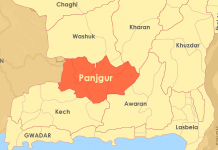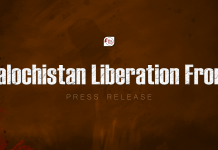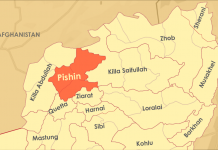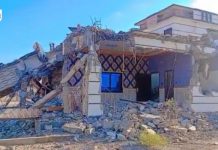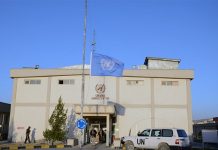Author: Sachaan Kambar
On May 28, 1998, without any advance warning to the local Baloch population, Pakistan conducted a series of nuclear tests in the Ras Koh mountains in Chagai district, Balochistan. Approximately five tests were carried out in a single day, severely affecting the local Baloch people that had been living there for generations. This day, called “Youm-e-Takbeer” (“Day of Greatness”) in Pakistan, is celebrated as a symbol of national pride and nuclear prowess. However, for the people of Balochistan, it is a day of deep sorrow and mourning, known as “Youm-e-Muzammat” or “Youm-e-Aasrok” (“Black Day”), marking the beginning of a tragic chapter in their history.
The choice of Balochistan for these nuclear tests was no coincidence. It was a calculated decision by the Pakistani state to shield its own population from the harmful effects of radiation, choosing instead to sacrifice the marginalized Baloch people. The nuclear tests in Chagai left a trail of devastation, affecting the environment, health, and livelihoods of the local population.
The nuclear explosions in Chagai turned the once fertile and resource-rich land into a barren wasteland. The Ras Koh mountains were torn apart, and the surrounding areas faced severe environmental damage. The radiation from the tests contaminated the soil and underground water, rendering the land unfit for cultivation and habitation. The once-thriving agriculture in the region, known for its crops like grapes, pomegranates, and dates, was devastated. Livestock, a primary source of livelihood for the Baloch, suffered massive losses as radiation poisoned the water and land.
The environmental impact extended beyond immediate radiation effects. The region experienced severe droughts, further exacerbating the already harsh living conditions. Natural springs dried up, and the once-abundant rain-fed farming became a distant memory. The land, now unable to support life, forced many to migrate in search of better living conditions, disrupting the social fabric and traditional way of life.
The health repercussions of the nuclear tests were dire and long-lasting. Cancer rates in Chagai and nearby areas skyrocketed, with an alarming increase in cases of various cancers, including leukemia and other radiation-induced illnesses. Hospitals in Quetta and other parts of Balochistan saw a significant rise in the number of cancer patients, overwhelming the already limited healthcare infrastructure.
The radiation effects also led to an increase in birth defects and other severe health issues among newborns. Children born in the aftermath of the tests suffer from various physical and mental disabilities, a painful reminder of the nuclear tests’ legacy. Skin diseases, respiratory problems, and other ailments became common among the local population, further straining their ability to lead normal lives.
Women in the region, particularly vulnerable to the effects of radiation, suffer from a range of health problems, including reproductive issues and cancers. The lack of adequate healthcare facilities and access to clean water and nutritious food compounds their suffering, leading to a cycle of poverty and illness that is difficult to break.
The socio-economic impact of the nuclear tests on Balochistan has been profound. The region, already one of the poorest in Pakistan, faced further marginalization and neglect. Promises made by the government to develop the area and provide compensation for the damage caused were never fulfilled. Basic amenities such as electricity, clean water, and healthcare remain scarce, and the people of Chagai continue to live in dire conditions.
Unemployment soared as the agricultural sector collapsed, and traditional livelihoods were lost. The economic deprivation forced many to leave their homes in search of work, leading to a loss of cultural heritage and community ties. The displacement and migration of people from Chagai have created social and economic challenges in the regions they move to, spreading the burden of the nuclear tests’ fallout.
The nuclear tests in Chagai also highlight the broader political and human rights issues faced by the Baloch people. Balochistan has long been treated as a colony by the Pakistani state, with its resources exploited and its people oppressed. The decision to conduct nuclear tests in Balochistan without consulting the local population or considering their welfare is a stark example of this exploitation.
The Baloch people have faced decades of political repression, with their leaders and activists often targeted by the state. Many have been abducted, tortured, and killed for speaking out against the injustices and demanding their rights. The nuclear tests and their aftermath have only intensified the Baloch struggle for freedom and justice, fuelling a sense of resentment and resistance against the Pakistani state.
The international community’s response to Pakistan’s nuclear tests has been largely muted, with little attention paid to the suffering of the Baloch people. This silence has allowed Pakistan to continue its oppressive policies in Balochistan with impunity. The global focus on nuclear non-proliferation and security has overshadowed the human and environmental costs borne by the people of Chagai and Balochistan.
The comparison with other nuclear test sites around the world, such as the Marshall Islands, Kazakhstan, and Algeria, reveals a disturbing pattern. Nuclear powers often choose marginalized or colonized regions for their tests, subjecting the local populations to severe radiation effects and long-term environmental damage. The people of Balochistan, like those in these other regions, continue to fight for recognition, justice, and compensation for the harm inflicted upon them.
The nuclear tests in Chagai were a tragic chapter in the history of Balochistan, highlighting the Pakistani state’s disregard for the lives and well-being of the Baloch people. The environmental, health, socio-economic, and political impacts of these tests have left a lasting scar on the region. As the world grapples with the challenges of nuclear proliferation and security, it must not forget the human cost of these weapons and the suffering of those like the Baloch, who have been forced to bear the brunt of nuclear ambition.
It is imperative for the international community and UN Security Council to recognize the plight of the Baloch people and hold Pakistan accountable for the harm caused by its illegal nuclear tests on the occupied territory of Balochistan. The voices of the Baloch must be heard, and their rights respected, as they continue to fight for justice, freedom, and a better future. The story of Chagai is a sobering reminder of the devastating consequences of nuclear weapons and the urgent need for a world free of nuclear threats.
Disclaimer: The views and opinions expressed in this article are those of the author and do not necessarily reflect the official policy or position of The Balochistan Post or any of its editors.











